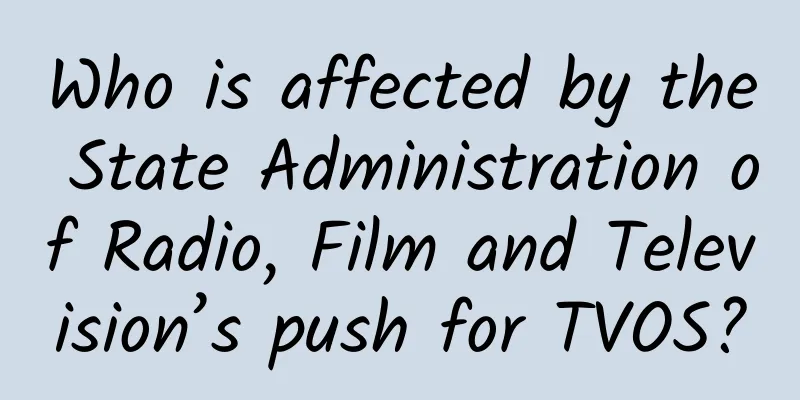Who is affected by the State Administration of Radio, Film and Television’s push for TVOS?

|
The State Administration of Radio, Film and Television has launched TVOS2.0. Friends who have recently started to pay attention to smart TVs are very confused and are asking if the way for hardware manufacturers/Internet companies to realize their profits has been blocked by the State Administration of Radio, Film and Television. Is the State Administration of Radio, Film and Television going to dominate the Internet TV market again? In fact, this question is not new. A few months ago, China Radio and Television Corporation said that it would promote the TVOS system in its operator system, which attracted great attention from the market. We made some interpretations at that time, and now we answer this question again, hoping to provide some reference for everyone. Our view is: Overall, the incident has a neutral impact on the Internet TV industry. On the one hand, TVOS is difficult to promote on a large scale, especially in the field of whole machines. On the other hand, considering the jurisdiction and operational capabilities of radio and television, even if the underlying OS is unified (basically impossible), the operating rights are still in the hands of the manufacturers themselves, and content can still be distributed through the Launcher interface. The core purpose of TVOS is to control and review the content of the TV. Background: SARFT began planning in 2011. In March 2012, it organized 17 units including scientific research institutes, equipment developers, and network operators (including Skyworth and Hisense) to establish the NGB TVOS Cooperation Development Group to carry out the research and development of NGB TVOS. In July 2013, the 1.0 version of the prototype system was realized. In June 2014, it was piloted in Jiangsu Cable and Shanghai Oriental Cable, and each piloted and promoted 500,000 sets. In the second half of the year, SARFT issued a notice to expand the pilot scope of TVOS smart TV operating system in cable operators. In December 2015, TVOS2.0 system was launched. In general, this notice is an extension of the previous regulatory work under the background of Document No. 181. The radio and television industry hopes to further strengthen the controllability of television content. For operators under their own systems, they must ensure security from the underlying OS. Will it have any impact on Internet TV manufacturers such as TCL/Skyworth/Hisense/LeTV/Xiaomi? The answer is no. The reasons are as follows: 1. The Ministry of Industry and Information Technology is the developer of TV standards, so the OS pre-installed at the factory is not under the jurisdiction of the radio and television in theory. Radio and television can only promote TVOS in its own operator system. Even if the Ministry of Industry and Information Technology is brought in to launch the new system, it is still difficult to jointly launch a national standard with the Ministry of Industry and Information Technology. This involves the coordination of interests of multiple parties and will also encounter great resistance in the industry. 2. Core difficulty: The OS system needs to be adapted to the underlying chip. The hardware fragmentation of TV sets is extremely prominent. The product models and chips used by various manufacturers vary greatly. Therefore, the technical feasibility of promoting a unified OS in the whole machine is also extremely low. Therefore, considering the scope of policy jurisdiction, the difficulty of compulsory promotion, and the technical impracticability, it is unlikely that we will see all television sets equipped with the TVOS system in the future, and everyone will most likely continue to use their own system. So let's take a step back and say that if the underlying OS is really unified, will it affect the manufacturer's user operation rights? The answer is no. First of all, it doesn't matter what system is used. The core is where the user data and operation rights behind it are. For example, it stands to reason that everyone is now using an OS modified from the Android system, but it cannot be said that the users are in the hands of Google. Even if the underlying OS is unified into TVOS in the future (considering the user experience, it is unlikely, and the ease of use and openness are definitely not as good as the Android system), the State Administration of Radio, Film and Television itself does not have the ability to operate users, and the operation rights are still in the hands of manufacturers. Moreover, through the Launcher interface and its own control, content distribution can still be achieved, which will not affect monetization. So will it have any impact on Internet TV box manufacturers, such as Skyworth Digital/Xiaomi? The answer is basically no. First of all, there is no substantial impact on the sales of set-top box hardware. As for the operation part, it needs to be divided into two parts: 1. Pure OTT set-top boxes are also under the jurisdiction of the Ministry of Industry and Information Technology. The State Administration of Radio, Film and Television cannot temporarily control the operating system. At the same time, the hardware fragmentation is also prominent, and TVOS is not likely to be used. 2. DVB+OTT set-top boxes that cooperate with radio and television, because the role of the box company in this model is to assist in operation and share the agreement, radio and television itself requires strong control over users, which has little to do with which OS is pre-installed. Although the TVOS system may affect the richness of the platform content and user experience, user operations are still in their infancy and the overall impact is minor. Who does the policy affect? We believe that it is not good for manufacturers who use the radio and television system to promote OS and seize the entrance, and it is not good for the radio and television system either. Industrial capital and Internet giants attach great importance to the 200 million existing users of the radio and television system. Many companies hope to export their own OS and seize the home entrance with the help of the promotion of DVB+OTT services. The radio and television policy is equivalent to blocking this road. In the future, there are only two ways for everyone to do, either to honestly provide content and take the content share, or to assist local radio and television in building operating platforms and backend systems, obtain user data and share part of the operating money. For broadcasting and television system operators, although the unification of the system is beneficial to the potential overall operation in the future, the standardization of the platform and content system can be achieved, and a protective wall can be built again by using policies. However, the overall level and future maintenance and upgrades of the TVOS system, which is developed by all parties in the industry through administrative orders, are difficult to guarantee. Abandoning marketization, it will be difficult for TVOS to compete with the Internet ecosystem in terms of experience in the future. Users will eventually choose to vote with their feet. Whether the market cake under the broadcasting and television system can be ensured not to be eroded by OTT and IPTV+OTT, there is still a long way to go. Appendix: What are the channels for watching TV? What are DVB\IPTV\OTT? Popularization of some basic concepts. Cable TV is commonly known as the DVB model. In the early days, people could only watch TV with cable TV services (except for satellite TV in remote areas), and they could only watch live broadcasts. TV stations and broadcasting operators were even the same company. Later, with the advancement of the separation of TV and the Internet, the production and broadcasting channels of TV were officially separated. Due to its long history and policy support, the broadcasting system has accumulated the largest number of household users in China, reaching more than 240 million. However, the users, data, and content of local radio and television are not connected, and the division is serious. Later, with the advancement of the integration of three networks, a second channel for watching TV emerged. With the help of China Telecom's nationwide network, IPTV, a new form, emerged and was first promoted by BesTV. Simply put, IPTV is watching TV through home broadband, without the need for additional cable services. You can watch live broadcasts and some on-demand programs. However, because IPTV affects the core interests of radio and television, its promotion in some areas has been hindered to a certain extent, and it is relatively popular in Shanghai. Later, the Internet began to penetrate the large screen in the living room, and a third channel for watching TV appeared, commonly known as OTT (over the top). Users can watch TV content through Internet TV/boxes. Since the Internet ecosystem gathers various video websites and content giants such as BAT, its experience and convenience naturally far exceed the original system, and it has flourished, and users began to escape the original cable TV system. However, the TV screen is one of the important propaganda positions with a large social influence. Therefore, in order to include Internet TV in the regulatory system, the radio and television issued Document No. 181 and corresponding regulatory measures. At the same time, in order to give the radio and television system a time window for transformation, Internet TV is not allowed to provide live broadcast services, and the integrated broadcast control/content service license for Internet TV is only issued to operators under the radio and television system. As a winner of Toutiao's Qingyun Plan and Baijiahao's Bai+ Plan, the 2019 Baidu Digital Author of the Year, the Baijiahao's Most Popular Author in the Technology Field, the 2019 Sogou Technology and Culture Author, and the 2021 Baijiahao Quarterly Influential Creator, he has won many awards, including the 2013 Sohu Best Industry Media Person, the 2015 China New Media Entrepreneurship Competition Beijing Third Place, the 2015 Guangmang Experience Award, the 2015 China New Media Entrepreneurship Competition Finals Third Place, and the 2018 Baidu Dynamic Annual Powerful Celebrity. |
<<: Sony's gaming boss: Virtual reality will be the future of gaming
>>: Is there really a need to panic about the wave of mobile phone OEM factory closures?
Recommend
iPhone 7 major changes: Should Apple remove the 3.5mm headphone jack?
Perhaps the biggest change in the iPhone 7's ...
Hulunbuir Mini Program Customization Company, how much does it cost to customize a course and purchase a mini program?
How much does it cost to purchase a customized mi...
No idea for event planning? Look here!
The creativity of an event is often an important ...
The delicious but hard to peel Torreya grandis finally "opened"!
In the past two days, at the Torreya grandis plan...
They love candied haws more than nectar. Are these bees stupid?
Author: Shi Jun Reviewer: Yao Jun (Associate Rese...
Towards innovation and intelligent future, Tago Intelligent Driving and industry partners interpret the practice and future of new quality productivity at the International Coal Expo
On May 16, TAGE Intelligent Driving brought its l...
It's an eyesore! After clicking on the information flow ad, I actually saw this...
I have talked about many information flow adverti...
Is liposuction really safe? You will understand after reading this!
Do you know where the term “sterile operating roo...
A healthy summer | The battle against mosquitoes in summer, how much do you believe the rumors?
In the hot summer, in addition to the moonlight i...
Teacher Charlie's "Screenwriter Incubation Camp"
Charlie's "Screenwriter Incubation Camp&...
Tik Tok data-based operation, promotion and analysis skills!
Today I will give you an in-depth analysis of Dou...
In order to survive, they can go without pooping for several months | Nature Trumpet
Welcome to the 67th issue of the Nature Trumpet c...
I accept your true fragrance, the leapfrog flagship realme X2 Pro hands-on review
The situation in the mobile phone market is not g...
30 information flow cases to teach you how to improve conversion
January's creative sharing is finally here! A...
The top ten technology trends in 2023 are coming! Big companies tell you these key points!
The past 2022 was a wonderful year. We saw the in...









